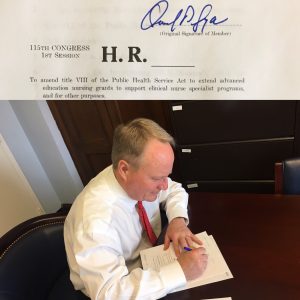Yesterday, Congressman David Joyce (R-OH), joined by a bipartisan group of colleagues, including Reps. Tulsi Gabbard (D-HI), Doris Matsui (D-CA), Rodney Davis (R-IL), Suzanne Bonamici (D-OR), Patrick Meehan (R-PA), and Kathy Castor (D-FL), introduced the Title VIII Nursing Workforce Reauthorization Act of 2017, (H.R.959).

Since the start of the 115th Congress, ANA has been working with key champions in the House to re-introduce the Title VIII Nursing Workforce Reauthorization Act, legislation that incentivizes nurses practicing in rural and medically underserved communities, and supports advanced nursing education, diversity grants, National Nurse Service Corp, nurse faculty loan forgiveness, and geriatric education.
ANA is currently working with its Senate champions to introduce companion legislation in the coming weeks. In the meantime, we’ll be busy gathering cosponsors and pushing to advance the bill.
Last year we successfully passed the Title VIII Nursing Workforce Reauthorization Act in the House but ran out of time in the Senate.
Help us push these critical programs over the finish line by contacting your Members of Congress.
